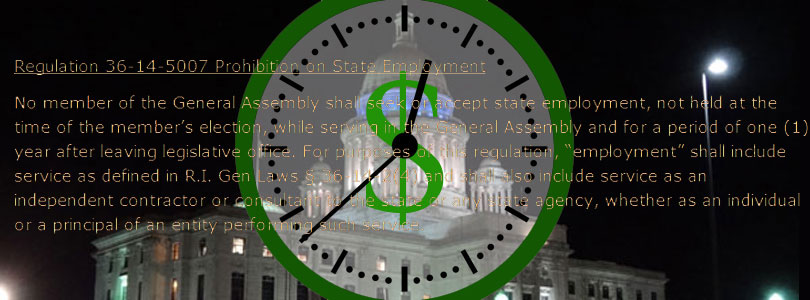Legislator Contracts and Contractors for Ethics Commission Purposes
Last week, the Ocean State Current reported that twenty-two sitting legislators or their employers have recently received payments from state agencies. In the week since, the state Ethics Commission has voted to investigate Representative Peter Palumbo (D, Cranston) who had previously been found to have bid on contracts to operate concession stands at state-owned beaches.
At issue is regulation 36-14-5007 of the state Code of Ethics, which reads as follows:
No member of the General Assembly shall seek or accept state employment, not held at the time of the member’s election, while serving in the General Assembly and for a period of one (1) year after leaving legislative office. For purposes of this regulation, “employment” shall include service as defined in R.I. Gen Laws § 36-14-2(4) and shall also include service as an independent contractor or consultant to the state or any state agency, whether as an individual or a principal of an entity performing such service.
Even if the Ethics Commission finds that Palumbo’s bids violated the Code, two distinctions could come into play making his case different from the twenty-one other senators and representatives mentioned in the Current’s report: What represents work as an “independent contractor or consultant,” and who represents a “principal”?
As reported in the prior article, the state argues that a member of the General Assembly who is a lawyer has no contract with the state if he or she represents clients who ultimately win judgments against an agency. For example, the lawyer of a Rhode Islander who appeals a ruling on unemployment insurance and wins receives his or her payment for that work directly from the Dept. of Labor and Training. The department’s position is that the appellant has a right to select his or her lawyer, and no contract between the state and the lawyer is implied.
Two examples for which the Current has received further information address the two ambiguities in regulation 36-14-5007.
Contracts
There can be no doubt that Senator Donna Nesselbush (D, North Providence, Pawtucket) is a principal at the law firm of Marasca & Nesselbush. The question in her case is whether the $5,077 that her business received in fiscal year 2012 amounts to a payment for contract work.
The state Department of Human Services paid the money to Nesselbush’s firm as part of a federal on-the-job (OJT) training program that the state DHS Office of Rehabilitative Services administers for disabled Rhode Islanders. According to spokesman Michael Jolin, the payments were part of an initiative for which the office “can assist with paying half of a disabled person’s salary during the vocational rehabilitation assessment period.”
The state reimburses an employer half of the salary of eligible employees during a period of training and evaluation. In this case, the employee has continued to work with the firm full time as a regular employee.
If the defining attribute of an “independent contractor” is the existence of a contract, then the “On-The-Job Training Agreement” required for the program would seem to apply. The official document says that the state, the employee, and the employer “agree that the Company will provide On-the-Job Training for the employee.” The agreement goes on to specify requirements, such as that “the Company will pay the Employee the prevailing wage” and that “the Employee will become a permanent employee of the Company.”
In short, in exchange for the money, the company is contracted to provide services that the state desires for the purposes of this program.
Principal
A light review of advisory opinions from the Ethics Commission reveals no clear guidelines for what roles within an organization indicate that a person is a “principal.” In general, the term seems to indicate an ownership stake in the company. In one case, for example, an elected official is described as ” a principal owner and the Vice President.”
If ownership is the determining factor, then the legislators in the Current’s report who are merely employed, even as executives, might not count as principals.
That isn’t the end of the matter, though. If partial ownership is sufficient, then Senator Marc Cote (D, Woonsocket) would be a principal of the Commercial Division of Boucher Real Estate, which is organized as a distinct corporation, because he is a shareholder and vice president. However, the state’s dollars go to Boucher Properties, which shares only a name and minimal organizational overlap.
Sen. Cote tells the Current that, “Boucher Properties, to the best of my knowledge, is solely owned by John Boucher for his personal real estate holdings.” According to Mr. Boucher, the state was already a tenant in a building that he purchased, and the senator was not involved in the purchase and has not been involved in any activities of Boucher Properties.
The Ethics Commission has held that landlord-tenant relationships do create the potential for conflicts of interest. However, it has also held that a degree of separation — being a business associate of a business associate — is enough distance to avoid a conflict.
Clarity Needed
Advisory opinions concerning business associations are only useful as guidance when it comes to the separate provision concerning members of the General Assembly. In some of the cases reported by the Current, the plain language of regulation 36-14-5007 appears to have been breached. In other cases, the connection between the legislators and the payments from the state appears to be sufficiently distant.
Some clarity may come with the Commissions investigation into Rep. Palumbo, but additional complaints may be required to clarify the lines that legislators may not cross.



